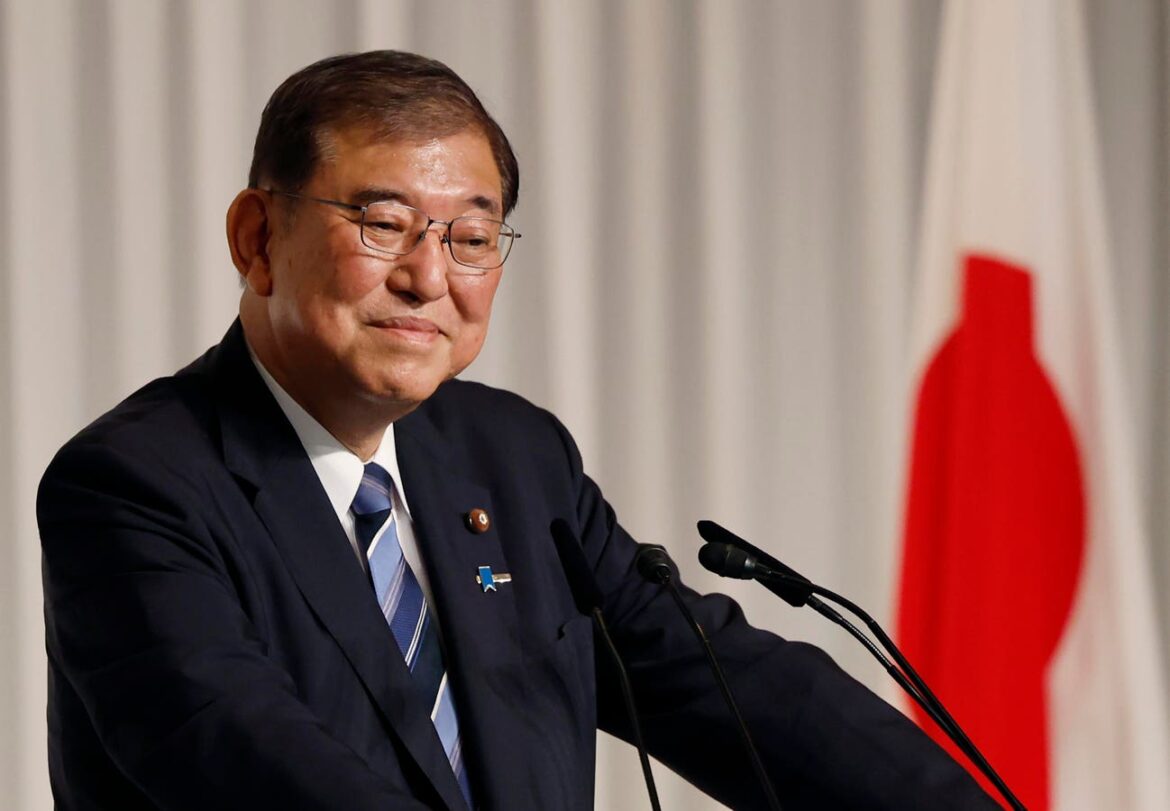Shigeru Ishiba
Kim Kyung-Hoon – Pool/Getty Images
As a desperate Donald Trump scours the globe for a large economy with which to forge a trade deal, he’s being rebuffed by one in ways he didn’t see coming: Japan.
Based on his experience during the Trump 1.0 years from 2017 to 2021, the U.S. president seemed certain Tokyo would be easy prey once again. It wasn’t an outlandish expectation, given then-Prime Minister Shinzo Abe’s obsequiousness. No world leader did more to help normalize and enable Trump early on than the late Abe.
In November 2016, Abe was the first world leader to make a beeline to Trump Tower in New York for an audience with the president-elect. It rankled the Tokyo political establishment that Trump brought his daughter and her husband to the meeting. But Abe put on a brave face and vouched for the next U.S. leader to all the world.
Abe gushed that Trump was a “trustworthy leader” and he was “convinced that Mr. Trump is a leader in whom I can have confidence.”
Those comments aged poorly. In short order, Trump pulled out of the Trans-Pacific Partnership, a cornerstone of Tokyo’s strategy to contain China (Abe had lobbied him to stay in TPP). Trump refused “friend” Abe’s pleas to give Japan a pass on tariffs. Then, Trump engaged in a bizarre bromance with North Korean tyrant Kim Jong Un in ways that weakened Tokyo’s national security.
Most embarrassing of all, perhaps, Trump humiliated Abe by making it known that the Japanese leader had nominated him for a Nobel Peace Prize. It left Abe with some serious explaining to do within his ruling Liberal Democratic Party.
Trump 2.0 had every reason to think Prime Minister Shigeru Ishiba would assume the junior position and give up the store. That’s turning into quite a misreading. Ishiba’s Japan is proving to be in no hurry to conclude another bilateral deal with Trump World less than six years after the last one. Talk, fine. But rush to a conclusion at the expense of Japan’s economy? No thanks.
Good for Ishiba. After Trump’s shock win in November, Ishiba was under extreme pressure to pull off another Abe. Many LDP bigwigs were after him to visit Mar-a-Lago or Trump Tower and score some brownie points with Trump 2.0. When Ishiba finally did get some face time with Trump in the Oval Office in mid-February, it was a reasonably forgettable affair.
At the start of the meeting, though, Trump suggests he could eliminate the $68 billion U.S.-Japan trade deficit in an afternoon. “I think it will be very easy for Japan,” Trump said. “We have a fantastic relationship. I don’t think we’ll have any problem. They want fairness also.”
Yet Trump World irked Tokyo with misleading facts about the trade relationship. Team Ishiba felt mislead on a corporate deal of great significance to the Japanese government: Nippon Steel’s proposed $14.1 billion acquisition of Pittsburgh-headquartered U.S. Steel. Trump said he would “mediate and arbitrate” a large “investment, rather than a purchase.” Ishiba returned to Tokyo believing he’d scored a minor win. Trump, it turns out, was just spitballing.
Japan has looked on, too, as Trump lieutenants suggested a trade deal with Tokyo was days away. Fast-forward 100-plus days and Ishiba’s trade team seems all out of trust. They’ve watched as Washington slapped a cartoonishly large 145% tariff on China and threatened ally Japan with which Trump claims to have a “fantastic relationship” with a 24% reciprocal tariff. That’s on top of an already imposed 25% tax on autos that’s raising recession risks in Asia.
This week, Japan’s top trade negotiator, Ryosei Akazawa, said “the slew of U.S. tariffs including reciprocal tariffs as well as those on automobiles, car parts, steel and aluminium, are regrettable. There’s no change to our stance of seeking a review, which is to say an elimination, of them.”
Now, does this sound like a government that’s about to bow to Treasury Secretary Scott Bessent, Commerce Secretary Howard Lutnick or trade negotiator Jamieson Greer? The Japanese go into trade talks only after countless hours of surveying data, gaming out scenarios, stress testing, perfecting highly choreographed talking points, agreeing upon pain thresholds and amassing binders full of contingency plans. Team Trump just seems to wing it.
Anyone who thinks Finance Minister Katsunobu Kato didn’t know what he was doing earlier this month when he said selling Tokyo’s $1.13 trillion of U.S. Treasuries “does exist as a card” in trade talks hasn’t been paying attention. Those vast dollar holdings offer Japan leverage. They’re also now in harm’s way following a move by Moody’s to revoke Washington’s last AAA credit rating.
And as Trump’s “big, beautiful bill,” which House Republicans passed this week, accelerates the increase in Washington’s $36 trillion-plus national debt, more downgrades are possible.
Ishiba’s “big, beautiful” pushback at Team Trump deserves more credit globally than it’s getting. For economies from South Korea to Singapore to Indonesia, it’s a reminder that Trump needs these trade “deals” more than Asia does. The longer Asia drags things out, the greater the chance Trump goes for U.K.-style trade pacts in name only.
As a long-time Asia writer, I haven’t had many good things to say about Ishiba’s leadership. But the man has Trump’s number and it’s a joy to watch him play it.


AloJapan.com